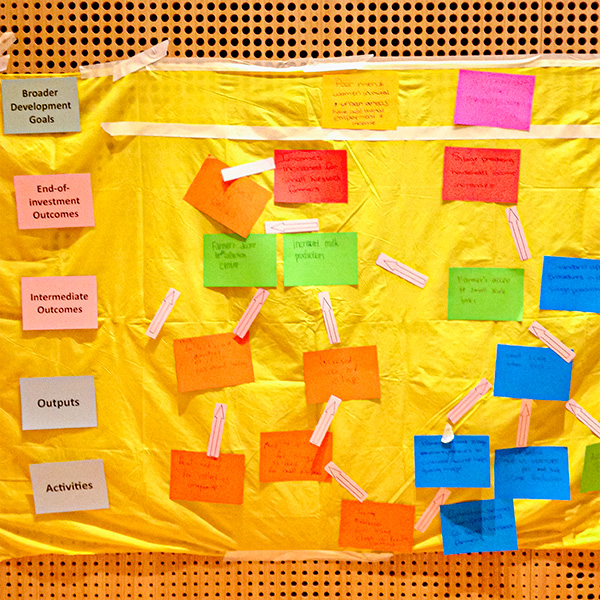Scott Bayley
Evaluation Services – Continuous improvement
What makes Scott Bayley Evaluation Services Unique?
Seniority and international credibility
Ability to handle complex, multi‑country evaluations
Strong methodological leadership
Emphasis on capacity building and organisational learning
Broad sectoral experience
Proven track record with high‑profile clients
In short, Scott Bayley Evaluation Services sits at the high‑expertise, high‑complexity end of the Australian sole‑trader evaluation market.
My interests
- formulating results measurement frameworks
- evaluation capacity building
- impact evaluation methods
- reflection and learning events
- meta-evaluation
- using performance feedback to drive continuous improvement while strengthening stakeholder relationships.
Over 25 years of experience in evaluation
Fellow of the Australian Evaluation Society
Scott has held senior positions with:
- Oxford Policy Management
- The Australian Department of Foreign Affairs and Trade
- AusAID
- The Asian Development Bank
- The Victorian Auditor General’s Office
Advisory capacity
Scott also served as an advisor to:
the United Nations Secretariat on performance measurement; UNICEF; UNDP; the Evaluation Capacity Development Group in Geneva; Valuing Voices: Sustainable Solutions in Prague; DFAT, NIAA, and DoHAC in Australia; and the world’s peak evaluation body, the International Organization for Cooperation in Evaluation. Scott is highly experienced in facilitating program improvements while enhancing stakeholder relationships.
Publications
More than 70 evaluation reports published
Scott has published over 70 evaluation reports across a number of fields including international development, health, education, the environment, infrastructure, capacity building, and governance.
Data collection
Scott is an experienced evaluation consultant with skills in applying a broad range of data collection methodologies
These include:
- document analysis
- interviews
- focus groups
- surveys
- benchmarking costs of service delivery
He has skills in both qualitative and quantitative data analysis and has an expert knowledge of program design, developing program logic models and theories of change, monitoring and evaluation (M&E) frameworks and practices, theory-based evaluations, measuring outcomes, assessing goals/program effectiveness and promoting learning as demonstrated by a number of internationally recognised evaluation publications.
What is evaluation?

a brief definition
The primary purpose of an evaluation is to support stakeholders in reflecting on past performance and to facilitate performance improvements. Governments, businesses, and not-for-profit agencies all around the world use evaluation evidence to learn what is and is not effective.
There are also some practical ways to think about what evaluation is. Evaluation is about increasing one’s confidence in making decisions or taking action. Evaluation is also about reality checking; we all make assumptions about how the world works based on our own experiences and beliefs. The data, findings, and insights generated from an evaluation can act as an effective check on these assumptions and judgements – in other words they can provide a window into the world as experienced by others.
Through their work evaluators seek to promote:
- Transparency and participation
- Reflection and debate
- Collective learning and informed decision making
- Management practices that support ongoing improvements.
Testimonials

what clients are saying
94% of the 2090 attendees agreed that your program logic course was clearly delivered and achieved the intended outcomes. Major Commonwealth department
This was fantastic.. you have inspired me, I am working on my program logic template this afternoon. Loved the real-life examples. So much to learn but I am excited. Commonwealth program manager
Your series of program logic workshops has really lifted our internal capability. You have a talent for presenting technical issues in a simply and easy to understand manner. Assistant Secretary, Commonwealth Department
Thank you for the excellent training on impact evaluation methods. Our entire department was buzzing afterwards. Head of Evaluation, Commonwealth Agency
Scott, this is a well-deserved recognition of your sustained contribution to the discipline of evaluation, I can’t think of anyone more deserving. On being awarded a Fellowship of the Australian Evaluation Society by the Chairperson
This report on public sector performance indicators is essential reading for commonwealth public servants. Former commonwealth auditor general
Having you work with our organisation felt like winning the world cup. An experienced M&E person who understood our business and could lead complex work streams. UK evaluation manager
Your report has been completed on time and to a very high standard. It contains very useful insights and recommendations for us to consider, and to help improve the program. Sincere thanks to Scott in particular, who has led the team with such skill and diligence, and who has been so dedicated to ensuring the team delivers a defensible product which will be useful to the program. Commonwealth evaluation client

















